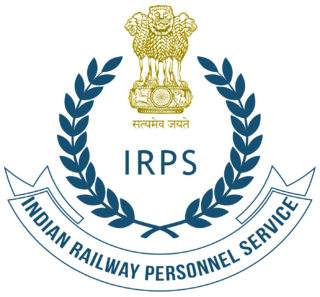The All India Services (AIS) comprises three Civil Services of India common to the centre and state governments, which includes the Indian Administrative Service (IAS), the Indian Police Service (IPS), and the Indian Forest Service (IFS). Civil servants recruited through All India Services by the central government are assigned to different state government cadres. Some civil servants may, later in their career, also serve the centre on deputation. Officers of these three services comply to the All India Services Rules relating to pay, conduct, leave, various allowances etc.

The Government of Sindh is the provincial government of the province of Sindh, Pakistan. Its powers and structure are set out in the provisions of the 1973 Constitution, in which 30 Districts of 7 Divisions under its authority and jurisdiction.
The Indian Railway Service of Signal Engineers (IRSSE) is a central engineering services group A cadre of the Indian railways. The officers of this service are responsible for managing the Signal and Telecommunications Engineering Organization of the Indian Railways.

The Indian Railway Personnel Service (IRPS) is a Prestigious Group 'A' Central Civil Service cadre of the Government of India. The central civil servants of this service are responsible for managing the Human Resources of the Indian Railways and welfare of railway employees and their families. Railways has a work force of about 1.4 million employees. It is the only civil service of its kind in India and it creates a cadre of central civil servants specialized in human resource management in government of India. The total sanctioned strength of the service is '478' after cadre restructuring orders on 09.03.2019.

The Ministry of Home Affairs, or simply the Home Ministry, is a ministry of the Government of India. It is mainly responsible for the maintenance of internal security and domestic policy. It is headed by Minister of Home Affairs.
Rajasthan Administrative Service, popularly known as RAS, is a state civil service of state Rajasthan along with Rajasthan Accounts Service, Rajasthan Police Service and other services. The officers are included in the state cadre of civil service officers. RAS officers undergo two years training at HCM Rajasthan State Institute of Public Administration. Cadre controlling authority for this service is Department of Personnel, Government of Rajasthan. The head of this service is Chief Secretary.
The Sri Lanka Administrative Service (SLAS) (Sinhala: ශ්රී ලංකා පරිපාලන සේවය; śrī laṁkā paripālana sēvaya) is the key administrative service of the Government of Sri Lanka, with civil servants working for both in the Central Government as well as in the provincial councils. It was formed as the Ceylon Administrative Service (CAS) in 1963 as the successor to the Ceylon Civil Service which was abolished on May 1, 1963. It is the senior of the public services.

Gazetted officers include all the Indian Police Service officers which are Group A officers of the cadre and all State Police Services officers of and above the rank of Deputy Superintendent of Police. All are arranged in a hierarchical order.
The Sixth Central Pay Commission was convened by the Union Cabinet of India on 5 October 2006. The Pay Commission was headed by B. N. Srikrishna. The other members of the Commission were Ravindra Dholakia, J. S. Mathur, and Member-Secretary Sushama Nath.
Central Secretariat Service is the administrative civil service under Group A and Group B of the Central Civil Services of the executive branch of the Government of India. They are governed by Central Secretariat Service Rules of 1962, which has been issued under the powers of Article 309 of the Constitution of India. The service members work under restrictions and rules of Central Civil Services (Conduct) Rules.

Employees' State Insurance Corporation is one of the two main statutory social security bodies under the administrative control of Ministry of Labour and Employment, Government of India, the other being the Employees' Provident Fund Organisation. The fund is managed by the Employees' State Insurance Corporation (ESIC) according to rules and regulations stipulated in the ESI Act 1948.

The Chairperson, Central Board of Direct Taxes (CBDT) is the senior-most IRS (IT) civil servant in the Government of India. The Chairperson of Central Board of Direct Taxes (CBDT) is the Special Secretary to the Government of India and also cadre controlling authority of the Indian Revenue Service.
Indian Defence Accounts Service (IDAS) is a Central Group 'A' Civil Service of the Republic of India established to provide Financial Advice, Payment, Accounts and Audit services to the Defence Services i.e. Indian Armed Forces and other allied organisations viz. Defence Public Sector Undertakings, Military Engineer Services, Border Roads Organisation, Defence Research and Development Organisation etc.
Joint Secretary to the Government of India is a post under the Central Staffing Scheme and the third highest non-political executive rank in the Government of India. The authority for creation of this post solely rests with the Cabinet of India.
Ramesh Inder Singh is a former Indian civil servant and the incumbent Chief Information Commissioner of the state of Punjab. He was the Deputy Commissioner of Amritsar during the Operation Blue Star, the military action at the Golden Temple in 1984 and has served as the Chief Secretary of Punjab. The Government of India awarded him the fourth highest Indian civilian honour of Padma Shri in 1986.
The 7th Central Pay Commission (7CPC), constituted in February 2014 the principles and structure of emoluments of all central government civilian employees including defence forces in India, submitted its report on 19 November 2015. 7CPC's recommendations affects the organization, rank structure, pay, allowances and pension, of 13,86,171 armed forces personnel. This helps A salary monitoring system is designed to determine and suggest needed changes to the salaries of government employees.page 105, para 6.2.2[3]
Armed Forces Headquarters Civil Services (AFHQCS) is a Group A Central Civil Services with induction at Group B grade, responsible for policy formulation, implementation and providing administrative support through civilian officers and staff to the Tri-services headquarters of Indian Armed Forces and Inter-Services Organizations (ISOs) such as DRDO, DGQA, DGAQA, DGNCC etc under the Ministry of Defence (MOD). The cadre was established in 1968. The number of employees in the service in 1968 was 1778; in 2011, 2644; and in 2016, 3235.

The Bangladesh Administrative Service (BAS) is the premier civil service cadre of the Bangladesh Civil Service, and which formulates and executes the policies of the government of the People's Republic of Bangladesh of which it is an inseparable part.

Provincial Civil Service / Provincial Civil Service , often abbreviated to as PCS, is the administrative civil service of the Government of Uttar Pradesh comprising Group A and Group B posts. It is also the feeder service for Indian Administrative Service in the state.

Provincial Police Service, often abbreviated to as PPS, is the state civil service for policing of Uttar Pradesh Police comprising Group A and Group B posts. It is also the feeder service for Indian Police Service in the state.







